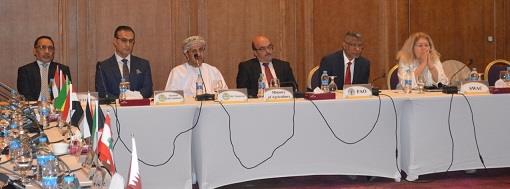Commission for Controlling Desert Locust in the Central Region - 31st session, Amman, Jordan
Hybrid Event, 17/02/2019 - 21/02/2019

The Executive Committee of the Commission for Controlling the Desert Locust in the Central Region (CRC) concluded its 31st session in Amman. Held from 17 to 21 February 2019 under the chairmanship of the Hashemite Kingdom of Jordan, the session brought together representatives of member states Egypt, Eritrea, Ethiopia, Iraq, Jordan, Kuwait, Lebanon, Oman, Qatar, Saudi Arabia, Sudan, Syria, Yemen, and the UAE. It was also attended by the senior officer of desert and other migratory pests at the Food and Agriculture Organization of the United Nations (FAO), secretaries of desert locust commissions in the Western Region and Southwest Asia, the director general of the Desert Locust Control Organization for Eastern Africa, and a representative of the United States Agency for International Development.
CRC Executive Secretary Mamoon Al Alawi presented working papers on activities carried out to help member states, including capacity building, research, publications, and reports on the situation of desert locust in the past two years. The Secretariat also presented a report on a new program to use drones to monitor desert locust as part the early warning system and the prevention strategy.
The meeting also discussed national and regional contingency plans and stressed the need for the member states to be ready in advance to control desert locust outbreaks. All these issues were elaborately discussed to improve and optimize operations aimed at controlling the spread of locust swarms and preventing outbreaks that cause massive damage to crops and pastures. Locust outbreaks have dire consequences for food security and may cause famine and impoverish countries.
The member states agreed to launch a Master's degree program on desert locust sciences in cooperation with the Sudan University for Science and Technology. The participants also stressed the need to conduct applied research to develop performance and improve the competence of locust detection and control workers through training sessions and workshops. They also underlined the importance of partnerships between the CRC and other organizations in the region and cooperation with the Desert Locust Information Unit at FAO headquarters to ensure effective control of the pest.
To be able to implement these ambitious plans, the CRC Secretariat stressed the need for the member states to pay their annual contributions and settle any arrears.
At the end of the meeting, all member states and other participants thanked Jordan for hosting the session and for the hospitality it offered to the participants.
Related news:
